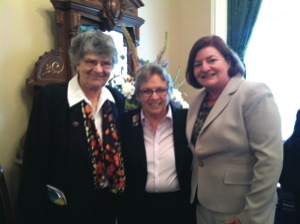
Thanks to the United States Supreme Court’s ruling on the marriage cases last week, we would be justified in letting out a sigh of relief that LGBT equality is finally becoming a reality and this month’s Pride celebration is the perfect opportunity to celebrate our recent successes.
Among the most wonderful new additions to our Pride Parade are the contingents of active duty servicemembers, thanks to the overturning of Don’t Ask Don’t Tell (DADT). The Supreme Court’s ruling in the DOMA case will also finally include military spouses in all that service has to offer, including benefits and housing.
But despite these great strides, it is not yet time to declare, “Mission accomplished!” Gaps remain in the patchwork of LGBT equality in the military.
First, we must remember that transgender people are not permitted to enlist in the military at all. Active servicemembers who come out as transgender are usually discharged.
Then, let’s do a fact check on marriage equality. The Windsor decision on DOMA ensures that those who wed in a marriage equality state will be recognized as spouses and will receive benefits. But military families move around, so the extent of their rights will be limited by where they are stationed. Of course, they cannot marry in a non-equality state. And if the couple has a child, whose names will be put on the birth certificate? We must secure marriage equality in all fifty states to eliminate this geographic discrimination.
Veterans are also disadvantaged by this state-by-state inconsistency. State benefits for veterans’ spouses may be refused. U.S. Veterans Administration death benefits are only available to spouses when the couple has been married for a year. Is this fair when unconstitutional and discriminatory laws prevented couples from getting married sooner?
We also have a responsibility to those who were discharged under DADT and the even harsher policies that preceded it. We must make these veterans whole. While most servicemembers discharged under DADT received honorable discharges, some were given “other than honorable” (OTH) status for “aggravating factors” or misconduct that might have been as innocuous as a public display of affection. This was common prior to the 1993 implementation of DADT.
An OTH discharge may limit medical and disability benefits, bars these veterans from housing assistance and educational benefits, and prevents them from obtaining a security clearance. Moreover, this “other than honorable” status often must be reported on job applications. Many states, including California, offer additional benefits to veterans who reside there. In California, these include CalVet housing loans and the right to be buried in a state cemetery. But state eligibility for these programs is usually based upon the discharge status determined by the U.S. government.
And even an honorable discharge based upon sexual orientation can have negative consequences. This includes a negative re-entry code, typically reserved for those with substance abuse problems, that signals that an individual is considered unfit for military service. The narrative explanation of the reason for discharge sometimes simply states, “Homosexual.” Because job applicants are often required to provide their military paperwork when applying for civilian jobs, these designations can out someone to a potential employer or lead them to conclude the veteran was guilty of misconduct. In the absence of federal non-discrimination protection and, in many parts of the country, state level protection, this can mean not getting the job.
In many cases, a discharge can be upgraded through legal action, but many veterans are unaware of this possibility. And, of course, there is no compensation for the many losses sustained by those who were wrongfully discharged.
A first step in making these veterans whole is to make them aware. For this reason, I was pleased to support an additional $6 million in this year’s state budget for County Veterans Service Officers (CVSOs) to outreach to veterans regarding benefits and to help with the processing of federal claims. This will continue to be one of my highest priorities. Our local CVSO has also made reaching out to LGB veterans a priority and can be reached at 858-694-3222.
As we celebrate the restoration of marriage equality during Pride and cheer for the military contingents in the parade, let us remember those who were left behind on the battlefield in the fight for equality.











